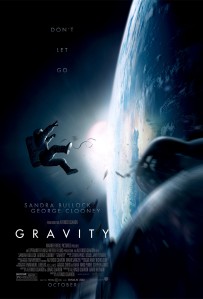Director: Alfonso Cuarón
Starring: Sandra Bullock, George Clooney
Manned spaceflight: Still the safest way to travel. Aside from the tragic losses suffered through various training exercises, as well as the missions which encountered problems but still ended with the crew returning home to Earth safely, only four manned space missions have resulted in fatalities. That’s two Russian/Soviet missions (Soyuz 1 & 11) and two American missions (Challenger, STS-51-L and Columbia, STS-107), all of which failed at either the launch or re-entry portions of the expedition. When you consider the finite separation there is on a space vehicle between its occupants and the vacuum of outer space, it’s incredible that more terrible tragedies have not taken place. That’s a credit not only to the brave men and women who’ve climbed into these spacecraft for the last five decades, but also to the people who build the damn things (even though certain lapses in the latter have been the direct cause of at least one or two of the four disasters). So, when I say that the events of the movie “Gravity” may seem a little far-fetched, I say so only because such a sequence has not happened yet.
Dr. Ryan Stone (Sandra Bullock) picked a hell of a time to go on her first space shuttle mission, STS-157 on board the Space Shuttle Explorer. While outside the space vehicle on a routine spacewalk to make adjustments to the Hubble Space Telescope, Stone, soon-to-be retiring Mission Commander Matt Kowalski (George Clooney) and one other crew member are encouraged to abort their mission and return to the ship for immediate re-entry into Earth’s atmosphere. It seems the Russians have accidentally destroyed one of their own satellites, and the resulting debris field is headed in the Explorer’s path. Unfortunately, the shuttle does not get out of the way in time. The Hubble Telescope and the Explorer are destroyed, and Stone and Kowalski are all that’s left of the Explorer crew.
Because the debris field has also taken out other communication satellites, all contact with Mission Control in Houston, Texas, has been lost. Stone and Kowalski truly are on their own. After about the half-hour mark, as the result of a self-sacrificial command decision made by Kowalski (one which, after you’ve seen it and thought about it, makes very little logical sense), Stone is the last surviving member of the Explorer crew. Hope for Dr. Stone lies in reaching the International Space Station, climbing aboard the remaining Soyuz capsule and using it to get home. But the capsule has been rendered unsafe for re-entry, and can only be used as a means for reaching the Chinese space station, Stone’s last option for survival. It’s pretty slim margin for error but, for someone in her position, even a small chance is better than none at all.
Watching “Gravity,” I couldn’t help but think of “Cast Away” starring Tom Hanks. Both movies are centered around characters who’ve been stranded with a slim chance of survival, and only through the merest fraction of luck do they manage to survive long enough to form a plan of escape back to civilization/Earth. Both also rely on the performance of a single actor to carry the majority of a film. Except for a very brief moment towards the end, Sandra Bullock is the only person on-screen in “Gravity” for its final sixty minutes. As in “Cast Away” with Tom Hanks, Sandra Bullock proves with her compelling performance in “Gravity” that you can’t, in fact, cast just anyone in the role. The other star of this film is its special effects, which are astonishing, if sometimes dizzying. On that note, I would argue that Alfonso Cuarón more than earned his Academy Award for Best Director.
“Gravity” has earned genuine praise among many former NASA astronauts. It has also drawn the wrath of certain nitpickers in the scientific community. Based on the Kessler syndrome, a theory posited in 1978 by the NASA scientist of the same name, it presents a disaster scenario that feels much more grounded in reality than some other, similarly themed movies. Regardless of how seriously one takes the “science,” it’s a movie, first and foremost, and should be treated as such. I find myself making this same argument often, but it makes it no less true. Even as its characters’ oxygen runs desperately thin, the movie’s entertainment supply knows no bounds.

Excellent! I look forward to seeing it!!!